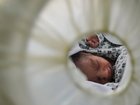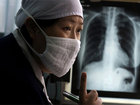An independent panel of experts on Wednesday recommended U.S. approval of a new Merck sleeping pill called suvorexant, but expressed concerns over the highest dosage and risks of drowsy daytime driving.
A majority of the panel voted that the drug was safe and effective in most cases, but experts were divided on the question of approving the safety of higher doses if lower doses did not appear to work for patients.
 Full Story
Full Story
GlaxoSmithKline PLC says it's starting an unusual collaboration with the U.S. government to develop several antibiotics for both bioterrorism threats and bacterial infections resistant to current medicines.
Antibiotic resistance will become a global crisis, experts predict, because most drug companies have cut investment in antibiotics. Instead, they're developing more-lucrative medicines for chronic conditions or rare disorders.
 Full Story
Full Story
A 33-year-old Polish man received a face transplant just three weeks after being disfigured in a workplace accident, in what his doctors said Wednesday is the fastest time frame to date for such an operation. It was Poland's first face transplant.
Face transplants are extraordinarily complicated and relatively rare procedures that usually require extensive preparation of the recipient over a period of months or years. But medical officials said the Polish patient's condition was deteriorating so rapidly that a transplant was seen as the only way to save his life. The patient is now being watched for any potential infections.
 Full Story
Full Story
U.S. teen births have dropped to a record low, but the country still has one of the highest rates among developed nations, the U.S. Centers for Disease Control and Prevention said Thursday.
"The overall rate declined 25 percent from 41.5 per 1,000 teenagers aged 15-19 in 2007 to 31.3 in 2011 -- a record low," the CDC report said.
 Full Story
Full Story
Top AIDS scientists were optimistic Wednesday of finding a cure for the disease that has claimed 30 million lives -- but said it might not work for all people.
The experts have high hopes for a treatment that will be given at an early stage of infection -- most likely a cocktail that includes an immunity booster and a virus killer.
 Full Story
Full Story
Scientists said Tuesday they had managed to kill lab-grown tuberculosis (TB) bacteria with good old Vitamin C -- an "unexpected" discovery they hope will lead to better, cheaper drugs.
A team from Albert Einstein College of Medicine in New York made the accidental find while researching how TB bacteria become resistant to the TB drug isoniazid.
 Full Story
Full Story
A Japanese cancer specialist said Wednesday she has started the world's first clinical trial of a powerful, non-surgical, short-term radiation therapy for breast cancer.
The National Institute of Radiological Sciences has begun the trial using "heavy ion radiotherapy" which emits a pinpoint beam that can be accurately directed at malignant cells, said Kumiko Karasawa, radiation oncologist and breast cancer specialist.
 Full Story
Full Story
The world is unprepared for a massive virus outbreak, the deputy chief of the World Health Organization warned Tuesday, amid fears that H7N9 bird flu striking China could morph into a form that spreads easily among people.
Keiji Fukuda told delegates at a WHO meeting that despite efforts since an outbreak of another form of avian influenza, H1N1, in 2009-10, far more contingency planning was essential.
 Full Story
Full Story
An experimental sleeping pill from U.S. drug company Merck is effective at helping people fall and stay asleep, according to reviewers at the U.S. Food and Drug Administration, which could soon approve the new drug.
But the experts warned of dangerous side effects at high doses -- including residual sleepiness during the day and, in a small number of subjects, suicidal thoughts -- according to their report posted Tuesday.
 Full Story
Full Story
A 66-year-old Tunisian man has died from the new coronavirus following a visit to Saudi Arabia and two of his adult children were infected with it, the Tunisian Health Ministry reported.
His sons were treated and have since recovered but the rest of the family remains under medical observation, the ministry said in a statement Monday. The World Health Organization confirmed the cases of the children, but said one of them was a daughter who was with her father for part of the trip to Saudi Arabia and Qatar. There was no immediate way to reconcile the differing reports.
 Full Story
Full Story



